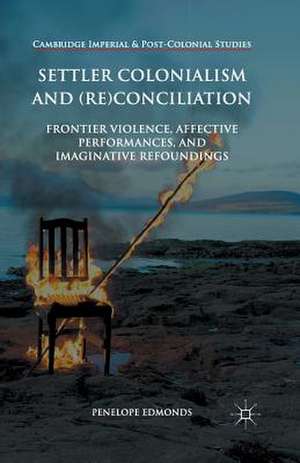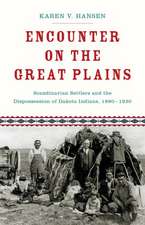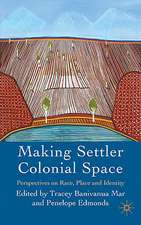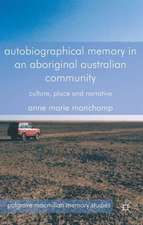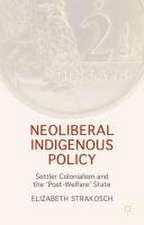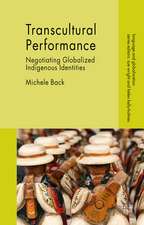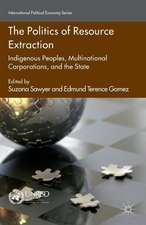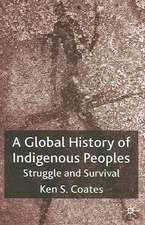Settler Colonialism and (Re)conciliation: Frontier Violence, Affective Performances, and Imaginative Refoundings: Cambridge Imperial and Post-Colonial Studies
Autor Penelope Edmondsen Limba Engleză Paperback – 6 apr 2018
| Toate formatele și edițiile | Preț | Express |
|---|---|---|
| Paperback (1) | 279.06 lei 6-8 săpt. | |
| Palgrave Macmillan UK – 6 apr 2018 | 279.06 lei 6-8 săpt. | |
| Hardback (1) | 500.73 lei 6-8 săpt. | |
| Palgrave Macmillan UK – 29 feb 2016 | 500.73 lei 6-8 săpt. |
Din seria Cambridge Imperial and Post-Colonial Studies
-
 Preț: 397.09 lei
Preț: 397.09 lei - 20%
 Preț: 755.49 lei
Preț: 755.49 lei - 23%
 Preț: 642.53 lei
Preț: 642.53 lei -
 Preț: 196.85 lei
Preț: 196.85 lei -
 Preț: 381.21 lei
Preț: 381.21 lei - 17%
 Preț: 491.70 lei
Preț: 491.70 lei - 18%
 Preț: 894.46 lei
Preț: 894.46 lei - 18%
 Preț: 774.83 lei
Preț: 774.83 lei -
 Preț: 280.10 lei
Preț: 280.10 lei - 18%
 Preț: 733.78 lei
Preț: 733.78 lei - 9%
 Preț: 625.46 lei
Preț: 625.46 lei -
 Preț: 386.11 lei
Preț: 386.11 lei - 18%
 Preț: 782.87 lei
Preț: 782.87 lei -
 Preț: 389.70 lei
Preț: 389.70 lei - 15%
 Preț: 644.18 lei
Preț: 644.18 lei - 15%
 Preț: 500.73 lei
Preț: 500.73 lei - 15%
 Preț: 640.37 lei
Preț: 640.37 lei -
 Preț: 396.40 lei
Preț: 396.40 lei -
 Preț: 390.63 lei
Preț: 390.63 lei - 15%
 Preț: 642.03 lei
Preț: 642.03 lei -
 Preț: 387.96 lei
Preț: 387.96 lei -
 Preț: 385.47 lei
Preț: 385.47 lei - 15%
 Preț: 640.37 lei
Preț: 640.37 lei -
 Preț: 390.63 lei
Preț: 390.63 lei -
 Preț: 389.88 lei
Preț: 389.88 lei -
 Preț: 385.08 lei
Preț: 385.08 lei -
 Preț: 393.52 lei
Preț: 393.52 lei -
 Preț: 390.63 lei
Preț: 390.63 lei -
 Preț: 491.01 lei
Preț: 491.01 lei - 18%
 Preț: 1000.56 lei
Preț: 1000.56 lei - 15%
 Preț: 643.34 lei
Preț: 643.34 lei -
 Preț: 390.63 lei
Preț: 390.63 lei - 15%
 Preț: 699.93 lei
Preț: 699.93 lei -
 Preț: 384.70 lei
Preț: 384.70 lei - 18%
 Preț: 894.46 lei
Preț: 894.46 lei - 15%
 Preț: 645.79 lei
Preț: 645.79 lei - 15%
 Preț: 693.71 lei
Preț: 693.71 lei -
 Preț: 384.31 lei
Preț: 384.31 lei - 15%
 Preț: 641.20 lei
Preț: 641.20 lei -
 Preț: 394.51 lei
Preț: 394.51 lei -
 Preț: 382.36 lei
Preț: 382.36 lei -
 Preț: 395.47 lei
Preț: 395.47 lei - 18%
 Preț: 1004.48 lei
Preț: 1004.48 lei - 15%
 Preț: 648.89 lei
Preț: 648.89 lei
Preț: 279.06 lei
Nou
Puncte Express: 419
Preț estimativ în valută:
53.41€ • 55.55$ • 44.09£
53.41€ • 55.55$ • 44.09£
Carte tipărită la comandă
Livrare economică 15-29 aprilie
Preluare comenzi: 021 569.72.76
Specificații
ISBN-13: 9781349671793
ISBN-10: 1349671797
Pagini: 253
Ilustrații: XVI, 253 p.
Dimensiuni: 140 x 216 x 19 mm
Greutate: 0.32 kg
Ediția:1st ed. 2016
Editura: Palgrave Macmillan UK
Colecția Palgrave Macmillan
Seria Cambridge Imperial and Post-Colonial Studies
Locul publicării:London, United Kingdom
ISBN-10: 1349671797
Pagini: 253
Ilustrații: XVI, 253 p.
Dimensiuni: 140 x 216 x 19 mm
Greutate: 0.32 kg
Ediția:1st ed. 2016
Editura: Palgrave Macmillan UK
Colecția Palgrave Macmillan
Seria Cambridge Imperial and Post-Colonial Studies
Locul publicării:London, United Kingdom
Cuprins
Introduction: Performing (re)conciliation in settler societies
1. United States 'Polishing the chain of friendship': Two Row Wampum Renewal celebrations and matters of history
2. United States 'This is our hearts!' Unruly reenactments and unreconciled pasts in Lakota country
3. Australia 'Walking Together' for Reconciliation: From the Sydney Harbour Bridge Walk to the Myall Creek Massacre Commemorations
4. Australia 'Our history is not the last word': Sorry Day at Risdon Cove and 'Black Line' survival ceremony, Tasmania.
5. Aotearoa New Zealand 'We we did not sign a treaty ... we did not surrender!': Contesting the Consensus Politics of the Treaty of Waitangi in Aotearoa New Zealand
1. United States 'Polishing the chain of friendship': Two Row Wampum Renewal celebrations and matters of history
2. United States 'This is our hearts!' Unruly reenactments and unreconciled pasts in Lakota country
3. Australia 'Walking Together' for Reconciliation: From the Sydney Harbour Bridge Walk to the Myall Creek Massacre Commemorations
4. Australia 'Our history is not the last word': Sorry Day at Risdon Cove and 'Black Line' survival ceremony, Tasmania.
5. Aotearoa New Zealand 'We we did not sign a treaty ... we did not surrender!': Contesting the Consensus Politics of the Treaty of Waitangi in Aotearoa New Zealand
Recenzii
“Penelope Edmonds, in Settler Colonialism and (Re)conciliation, employs a historical methodology to examine how reconciliation discourse is deployed and refuted in affective performances. … a useful addition to the literature on transitional justice and on reconciliation in settler societies, particularly because they acknowledge the tensions around whether and how transitional justice might actually be of use for relationships between Indigenous peoples, non-Indigenous peoples and the state.” (Sophie Rigney, International Journal of Transitional Justice, Vol. 11 (2), July, 2017)
“The strength of Edmonds’ analysis lies in her transnational comparisons that show how Indigenous performances hold settler colonial societies to account for the way they sanitise the past through reconciliation events to realise a specious post-racial future. … this book is a vital contribution to Indigenous studies because of the tendency of settler colonial societies to use the consensus politics of reconciliation to rationalise the theft of Indigenous lands and colonial violence.” (Joshua L. Reid, Australian Historical Studies, Vol. 48 (2), May, 2017)Notă biografică
Penny Edmonds is Associate Professor and Australian Research Council Future Fellow in the School of Humanities, University of Tasmania, Australia. She is the author of Urbanizing Frontiers: Indigenous Peoples and Settlers in 19th-Century Pacific Rim Cities (2010); co-editor of Making Settler Colonial Space: Perspectives on Race, Place and Identity (2010) and co-editor of Conciliation on Colonial Frontiers: Conflict, Performance, and Commemoration in Australia and the Pacific Rim (2015).
Textul de pe ultima copertă
This book examines the performative life reconciliation and its discontents in settler societies. It explores the affective refoundings of the settler state and reimaginings of its alternatives and, in particular, the way the past is mobilized and reworked in the name of social transformation within a new global paradigm of reconciliation and the 'age of apology'. In search of a new emancipatory politics, the book takes particular account of Indigenous-led refutations or reworkings of consensus politics in public culture. Taking case studies from the USA, Australia, and Aotearoa New Zealand, it traces the prehistory of reconciliation's present in settler states, a critical and contested political process which is especially salient where formal decolonization cannot occur. The dynamic process of drawing on the past to forge new alliances and imagined futures is a crucial aspect of the political realm – one that we are jointly acting out together; and it is worked out from the affectiveand overlapping spaces of heart and horror.
